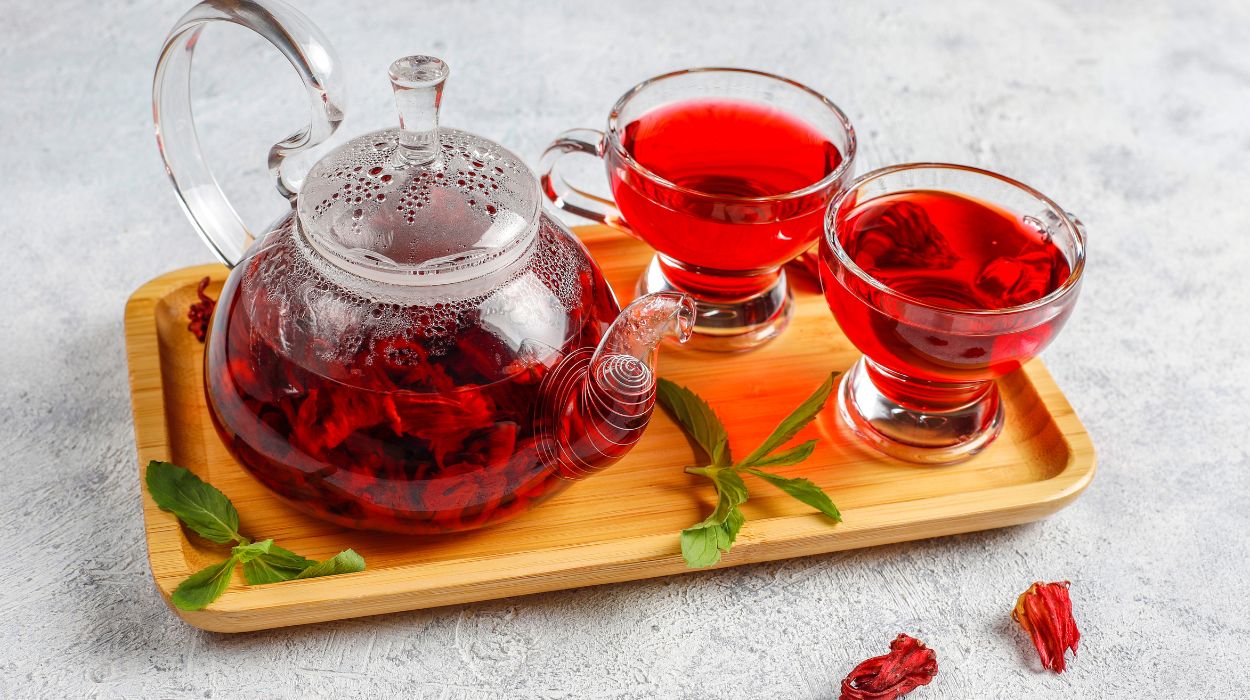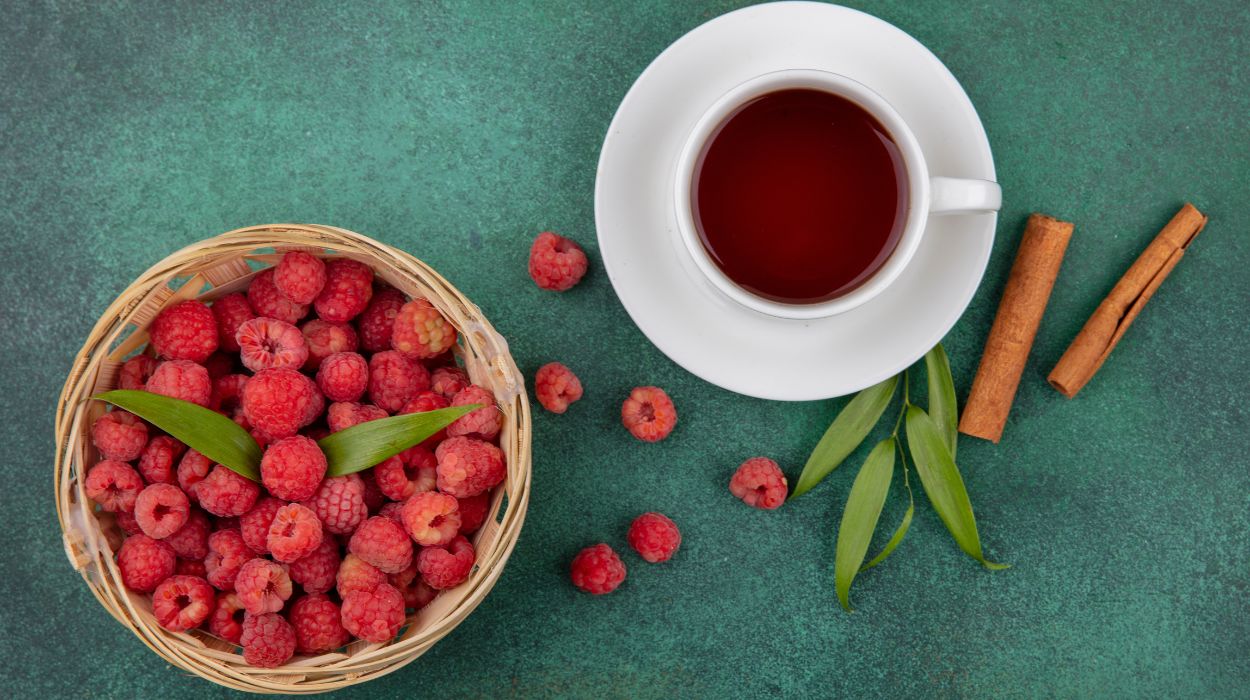 Expert's opinion
Expert's opinion
Expert's opinion
The article is a subjective view on this topic written by writers specializing in medical writing.
It may reflect on a personal journey surrounding struggles with an illness or medical condition, involve product comparisons, diet considerations, or other health-related opinions.
Although the view is entirely that of the writer, it is based on academic experiences and scientific research they have conducted; it is fact-checked by a team of degreed medical experts, and validated by sources attached to the article.
The numbers in parenthesis (1,2,3) will take you to clickable links to related scientific papers.
Hibiscus Tea During Pregnancy: Is It Safe Or Risky In 2024?

While pregnant, there are many foods, herbs, and supplements to be avoided. While hot drinks can be comforting to consume, getting more coffee or tea might not be an option due to the limit on caffeine consumption. Herbal teas might be an alternative to get that satisfaction.
Hibiscus tea is a tart tea with a beautiful deep red color that is consumed traditionally in different parts of the world. Not all herbal teas are recommended since they might negatively affect the pregnancy or the fetus. Some mothers may wonder, “Can you drink hibiscus tea while pregnant?” So is hibiscus tea one of the ones to avoid, or is it a safe option for pregnant women to consume?
Is Hibiscus Tea Safe During Pregnancy?
Is it safe to drink hibiscus tea during pregnancy? Although Hibiscus sabdariffa is considered generally safe for general consumption, it is not recommended[1] for pregnant or breastfeeding women to consume. If interested in using herbal or nutrition supplements, discuss them first with your medical provider. Most supplements are not regulated and may contain ingredients that affect the mother and/or the baby.
What Is Hibiscus?
Hibiscus sabdariffa[2] is also known as roselle or Jamaica, amongst other names. However, be careful not to confuse it with the hibiscus rosa sinensis, which is a different kind. This Hibiscus sabdariffa flowering plant is a species from the hibiscus or mallow family sourced mainly from Africa, Asia, and Latin America. People in these regions consume both hot or cold tea from hibiscus extract made from hibiscus flowers. The hibiscus calyces or flowers are used for culinary applications like beverages, jams, and cakes.
Traditionally, parts of the hibiscus plant[2] are used in different countries as a diuretic, as an antihypertensive, to manage constipation, and to treat kidney and liver disease. Hibiscus is used in ethnic medicine for breastfeeding women to promote milk production.
Potential Benefits Of Drinking Hibiscus Tea

Researchers[3] have found that Hibiscus sabdariffa has several health benefits. Most are dose-dependent, so locking down exact recommendations requires more investigation. It can help lower blood pressure. Hibiscus can affect kidney mechanisms and increase renal perfusion and filtration rate. This allows it to work as a diuretic, which can have a blood pressure-lowering effect.
This research also indicates that hibiscus can help lower lipids, particularly triglycerides, low-density lipoprotein cholesterol, and total cholesterol. This supports a heart-protective effect. It has been found that polyphenols in this plant can potentially inhibit lipid accumulation and synthesis, which can work as an anti-obesity compound.
Due to its anti-inflammatory properties and protective effect from neuroinflammation, this plant also has the potential to mitigate the effects of Alzheimer’s.
The calyxes of Hibiscus sabdariffa are a source[4] of antioxidants, in particular anthocyanins, phenolic acids, flavonoids, and organic acids. The antioxidants related to the rich color of this plant may be associated with its potential use to treat high blood pressure, high cholesterol, and diabetes and be protective against cancer.
The Alternative Way
If you’re pregnant or breastfeeding and need an alternative, eating a diet that includes a variety of fruits, vegetables, and whole grains may present the same benefit that hibiscus provides. You can include legumes as a source of protein on some days instead of meats. Follow a dietary guide like My Plate[5] to create balanced meals.
Ensuring you get enough of the right foods daily can also help you with breast milk production. Although there are herbs that are traditionally used to stimulate milk production during breastfeeding, you can also use foods like lactation cookies made with oats, Korean seaweed soup, or Indian dal made from split peas.
Risks Of Drinking Hibiscus Tea While Pregnant
The overall use of hibiscus tea during pregnancy and breastfeeding is not recommended. Studies cannot conclude the effectiveness and safety of hibiscus use by women during pregnancy or while lactating. Also, there may be some hormonal effects that are concerning. Until more evidence is available, it is best to avoid it.
Might Terminate Pregnancy
According to the National Library of Medicine, the use of Hibiscus sabdariffa may have negative effects when used during pregnancy. It may stimulate a menstrual cycle and terminate the pregnancy. It probably takes more than just hibiscus to result in pregnancy loss, but if you have identified risks, to begin with, the added risk of hibiscus could be additive to those you already have.
May Affect The Offspring
In animal studies, it was found that pregnant rats and lactating rats showed an increase in postpartum weight after birth. It also showed that the offspring of the rats experienced a delay in the onset of puberty, supporting the hormonal concerns. The rat offspring also had an increase in body mass index after puberty. These undesirable effects have not been confirmed in humans, but they do indicate their interaction with biological processes.
In Nigeria, seeds from the hibiscus plant are used to enhance lactation. Although there is no human evidence for it, this lactation effect was found in animal studies due to increased blood levels of prolactin, the milk letdown hormone. This could explain why it is traditionally used to induce breast milk production.
Consuming hibiscus tea during breastfeeding is considered possibly unsafe as hormonal aspects may affect the infant. It would just be safer to avoid drinking hibiscus tea while pregnant or breastfeeding.
Make sure to read the labels of all your teas and supplements. You can find hibiscus flowers or calyx included in commercial herbal tea blends. And beware that you may also consume hibiscus tea as part of a barista-made fruity drink.
Very few studies in humans show any benefit of using hibiscus seeds, calyx, or flowers during pregnancy. Although the amount you might get when you consume hibiscus tea is smaller than in hibiscus supplements, it might be good to avoid it until further evidence is present or after discussing it with your medical provider.
Other Herbal Teas To Avoid During Pregnancy
Some herbs are considered unsafe, likely unsafe, or not proven safe by the FDA for consumption due to the possibility of them affecting the uterus, hormones, or the fetus. The following teas should be avoided during pregnancy:
- Dong Quai.
- Aloe.
- Ginseng, e.g., American & Korean.
- Chamomile.
- Coltsfoot.
- Juniper berry.
- Pennyroyal.
- Buckthorn bark.
- Comfrey.
- Labrador tea.
- Sassafras.
- Duck root.
- Lobelia.
- Stinging nettle.
- Senna leaves.
Some herbs are known to stimulate the uterus, induce labor, affect hormone levels, or pass through the placenta to the baby. All these are important considerations during pregnancy. Some of these herbs are known to have some specific harmful effects on the non-pregnant individual, so they apply to pregnant women, too.
You may also need to take caution with non-herbal teas that contain caffeine. It is recommended that pregnant women limit caffeine to less than 300mg per day or around two 8-ounce cups. Take into account that teas like green tea and black tea and mixes like chai tea contain caffeine.
Herbal Teas Considered Safe During Pregnancy

On the other hand, these other herbal teas are safe to consume during pregnancy:
- Red raspberry leaf- may ease labor, so consult with your provider first.
- Ginger root.
- Peppermint.
- Citrus peel.
These last teas are considered safe. You can use these, particularly ginger, to soothe your stomach if experiencing any morning sickness. It can also be comforting to drink tea on a cold day, without worrying about stimulants, because drinking herbal tea also has the benefit of being caffeine-free.
Feel free to use herbs sprinkled on your foods. Most common herbs and spices used in cooking rarely pose a risk during pregnancy since they are used sparingly. On the other hand, using herbs in tablets, tea, or as a tonic may contain extracts of different components that may be harmful in pregnancy. If you decide to use a specific herb, make sure to research its safe use in pregnancy.
If pregnant, always discuss with your medical provider, midwife, and herbalist to make sure they are safe. Also, discuss if this herb might have any interaction with any medication you are using. Some herbs have no evidence proving they are safe to consume during pregnancy, which is the case for hibiscus tea.
Hibiscus Tea Pregnancy: The Bottom Line
While pregnant it is important to avoid specific foods, products, and activities that may pose a risk to either mother or baby. Hibiscus sabdariffa, although a tasty tea purported to have potential health-protective benefits, should be avoided while pregnant or breastfeeding.
Instead, opt for safe teas like ginger root or citrus peel. Use foods like fruits and vegetables to reap some protective health benefits for you and your baby.
+ 5 sources
Health Canal avoids using tertiary references. We have strict sourcing guidelines and rely on peer-reviewed studies, academic researches from medical associations and institutions. To ensure the accuracy of articles in Health Canal, you can read more about the editorial process here
- Medlineplus.gov. (2021). Hibiscus sabdariffa: MedlinePlus Supplements. [online] Available at: https://medlineplus.gov/druginfo/natural/211.html.
- Da-Costa-Rocha, I., Bonnlaender, B., Sievers, H., Pischel, I. and Heinrich, M. (2014). Hibiscus sabdariffa L. – A phytochemical and pharmacological review. Food Chemistry, [online] 165, pp.424–443. doi:https://doi.org/10.1016/j.foodchem.2014.05.002.
- Journal of the American Nutrition Association. (2022). Mechanisms of Action of Nutritionally Rich Hibiscus sabdariffa’s Therapeutic Uses in Major Common Chronic Diseases: A Literature Review. [online] Available at: https://www.tandfonline.com/doi/abs/10.1080/07315724.2020.1848662?journalCode=uacn210.
- Izquierdo-Vega, J., Arteaga-Badillo, D., Sánchez-Gutiérrez, M., Morales-González, J., Vargas-Mendoza, N., Gómez-Aldapa, C., Castro-Rosas, J., Delgado-Olivares, L., Madrigal-Bujaidar, E. and Madrigal-Santillán, E. (2020). Organic Acids from Roselle (Hibiscus sabdariffa L.)—A Brief Review of Its Pharmacological Effects. Biomedicines, [online] 8(5), p.100. doi:https://doi.org/10.3390/biomedicines8050100.
- Myplate.gov. (2020). Pregnancy and Breastfeeding | MyPlate. [online] Available at: https://www.myplate.gov/life-stages/pregnancy-and-breastfeeding.



